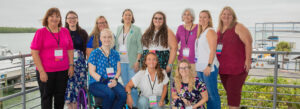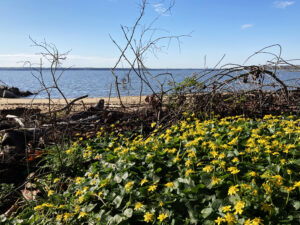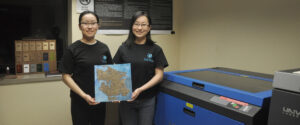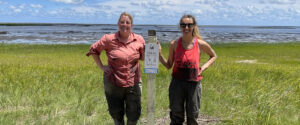
Community, Inclusivity, and Connection: The Women of the Water Conference
Community, Inclusivity, and Connection: Reflecting on the 2023 Women of the Water Conference By Kaitlyn Theberge | Virginia TechBy Hayley Lemoine | Florida
By Serina Wittyngham | Virginia Institute of Marine Science
There are a lot of great scientists out there. But how do we learn about them? Better yet, how do others learn about us? Of course, there is always the literature — but let’s be honest, keeping track of and reading scientific literature feels like drinking from a fire hose with a straw. Plus, we all have that ever-growing folder full of papers just waiting for us to read.
As graduate students, we are constantly juggling our courses, demands from our lab and adviser, personal lives, and so much more; often putting writing our own manuscripts on the very back burner. In the times of instantaneous information via social media, waiting around to read our folders or for our paper to get published is no longer the only way to get our science out there. And in an ever-changing employment landscape, getting our names and our research front and center is often our only hope of obtaining a “real job” one day. Enter the topic of today: the importance of self-promotion (and also, how to accept others’ help along the way).
It is scary to be vulnerable with our science. As graduate students, we lay everything we have on the table — our hopes, dreams for the future, we even place holds on our personal lives, all in the name of science. It can also feel unnatural to share and celebrate our accomplishments, especially with the intention of securing our professional futures. But I am here to say that it is okay, and encouraged, because if we don’t promote ourselves, who else will? Over the last six months, I have had to reprogram my brain to accept this fact and have tried to refocus my energy on getting my message out into the real world.
I started this mission with two goals in mind (that don’t require being an extrovert). First, to cultivate a professional Twitter, and second, to make a personal website (to then promote on my Twitter). I’ve had many other graduate students tell me about the greatness of science Twitter, but you really have to experience it to believe it. I have found an overwhelming amount of information via Twitter, from postdocs to jobs to cutting-edge methodologies. I have also found a compassionate and engaging community that has provided advice on a variety of topics, including conflict-resolution and authorship.
Scared about where to start? The Twitter algorithm has got you covered – it will connect you with researchers near and far that have varying levels of overlap with your interests. Still trying to come up with the perfect handle? There are tons of suggestions online, and even a handle generator!
If we don’t promote ourselves, who else will? I have had to reprogram my brain to accept this fact and have tried to refocus my energy on getting my message out into the real world.
In the times of instantaneous information via social media, waiting around to read our folders or for our paper to get published is no longer the only way to get our science out there.
When it came to making my personal website, I used my Twitter to solicit web design ideas and ended up creating it through Wix.com. Although still a daunting task, the combination of their templates and the advice I received through Twitter enabled me to set up my website without putting too many hours into it.
So, my overall recommendations here are to first find your tribe through Twitter by filling it with other brilliant researchers — and don’t be afraid to post your questions. Tag Academic Chatter (@Academic_Chatter) or include #PhDChat to get diverse perspectives. Secondly, dive into creating and curating your personal website. Your brain will appreciate the break and you can flex your creative muscles (or if you’re like me and don’t have them, ask for help on Twitter).
It’s also important to add, this promotion mission was made much easier because of my Virginia Sea Grant graduate research fellowship. The staff at VASG have the tools to jump-start this process (you just have to reach out). Once I took the plunge and had the VASG media staff join me in the field, my science has gotten more attention.
For example, VASG posted on social media one of the photos they took and a brief synopsis of my dissertation research. That same day, I received an email from the Science Museum of Virginia asking me to give a talk for their lunchbreak seminar. This was my first (and only) invited talk and never would have happened without the platform and promotion from VASG.
So, if you take away nothing else from this blog post, remember that: 1) it’s okay to celebrate and champion your successes, and sometimes doing this with strangers on Twitter is weirdly less scary, and 2) use the resources that are available to you to help get your science out there. We all strive to positively impact our world, even in the smallest ways, and promotion and advertising may make all the difference.
Serina Wittyngham is a Ph.D. Student at the Virginia Institute of Marine Science and VASG graduate research fellow studying how Spartina alterniflora adapts to environmental stress.
Photos by Aileen Devlin | Virginia Sea Grant
Published March 23, 2021.
It’s okay to celebrate and champion your successes, and sometimes doing this with strangers on Twitter is weirdly less scary.

Community, Inclusivity, and Connection: Reflecting on the 2023 Women of the Water Conference By Kaitlyn Theberge | Virginia TechBy Hayley Lemoine | Florida

The Virginia Sea Grant Commonwealth Coastal & Marine Policy Fellowship has given me the opportunity to learn some more broadly practical jargon.

“We realized that the VA SEA lesson plan project could provide a great opportunity to create a lesson plan for K-12 students and teachers around the globe based on our current research. “

Armed only with a phone, visitors can use our tool to document coastal changes with repeat photography.

Your request has been submitted.
Stay up-to-date on fellowship, internship, training, and research funding opportunities offered by Virginia Sea Grant.